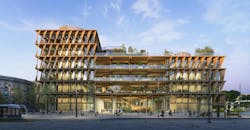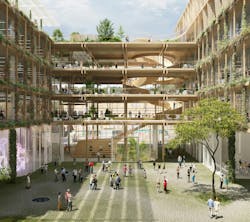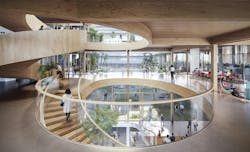Net-positive, mass timber building will promote research on planetary well-being in Barcelona
ZGF Architects, along with Barcelona-based firms MIRAG and Double Twist, have designed a net-positive, mass timber center for research on planetary well-being. Located in Barcelona, the Mercat del Peix Research Center will bring together global experts in the experimental sciences, social sciences, and humanities to address challenges related to the future of the planet, including biodiversity loss and climate change economics and governance. In January, the design won a global laboratory design competition that drew 41 entries from 10 countries.
Near the shore of the Mediterranean Sea, the center will be located within the Ciutadella of Knowledge, a hub of scientific and cultural innovation, and on the site of a former historic fish market, Barcelona’s Mercat del Peix. The building also will be adjacent to the 19th-century Parc de la Ciutadella, the city’s main public park and green space.
The 452,084-sf Mercat del Peix Research Center will comprise two connected net-positive, mass timber buildings, with a courtyard between them. At five stories, the dry lab will host the interdisciplinary projects of Universitat Pompeu Fabra (UPF). And at seven stories, the wet lab will house the headquarters of the Institut de Biologia Evolutiva (IBE).
The design intends to encourage researchers from both organizations to come together but also to draw researchers from the Ciutadella of Knowledge and beyond. To achieve this, design elements such as floor-to-ceiling windows and the courtyard promote circulation and heighten occupants’ interest in collaboration. A shared, five-story mass timber spiral staircase leads to a large rooftop deck. More intimate destinations include the ground-floor cloisters alongside the courtyard.
The research center’s mass timber building envelope and mechanical systems aim to reduce embodied and operational carbon, while optimizing the quality of the interior environment. Sun shades blunt the intensity of the Mediterranean sun, while also bringing daylight into the building and offering views of the sea. Operable windows provide natural ventilation, and zoned climate controls and chilled beams reduce energy loads while ensuring comfort.
The Mercat del Peix Research Center expects to be operational by the end of 2025.
On the Building Team:
Owner: University Pompeu Fabra
Design architect: ZGF/MIRAG/Double Twist
Architect of record: ZGF/MIRAG/Double Twist
MEP engineer: AIA Instal.lacions Arquitectòniques
Here is the press statement from ZGF:
A jury has selected ZGF Architects with its Barcelona-based teammates MIRAG/Double Twist as the architectural competition winner for the design of a net-positive research center whose visionary transdisciplinary research is anticipated to foster new fields of knowledge and approaches to planetary well-being. The new laboratory, the Mercat del Peix Research Center, will unite global experts in the experimental sciences, social sciences, and humanities to address the world’s most complex and vexing challenges related to the future of our planet, including biodiversity loss and climate change economics and governance.
“Together with our partners at MIRAG/Double Twist, ZGF brings our expertise in sustainable laboratory design to create a net-positive home for the world’s most impactful planetary-health research,” said Ted Hyman, Managing Partner of ZGF. “As a competition team, our expertise combines an understanding of the culturally important site and the complexities of building sustainable laboratories. It will result in a project reflective of the world-changing initiatives that will happen inside.”
The caliber of research and knowledge transfer anticipated for this world-class hub drew a remarkable number of participants to the design competition. A total of 41 entries from 10 countries winnowed to five shortlisted teams. Besides the winning team of ZGF/MIRAG/Double Twist, the shortlist included Kengo Kuma & Associates; Moneo Brock; miba architects and DATAAE; and Arquitecturia Camps Felip with London-based Allies and Morrison Ltd.
Competition jury president Jaume Casals, a professor and former rector of Barcelona’s Universitat Pompeu Fabra, or UPF, said the ZGF/MIRAG/Double Twist team’s design “optimally combines ingenuity in meeting the needs of users…” achieves an “urban balance,” and “brings the brightness and boldness…that a project of this nature so richly deserves given that it is destined to play a vital role in both the city’s and country’s social development.”
ZGF’s strength as a designer of net-zero and net-positive office, laboratory, research, and energy facilities, with MIRAG/Double Twist’s culturally significant building designs in Catalonia—including the ongoing execution of Antoni Gaudi’s Sagrada Familia—ensured a fully sustainable and culturally relevant winning design for a site of great significance to Barcelona. The site is near the shore of the Mediterranean Sea and adjacent to the lush 19th century Parc de la Ciutadella, the city’s primary public park and green space, with a poignant relationship to Catalonia’s bids for independence. Specifically, the research center will reside within the Ciutadella of Knowledge, a contemporary European node of scientific and cultural innovation, at the site of a former historic fish market, Barcelona’s Mercat del Peix.
The Mercat del Peix Research Center will host researchers from two institutions and is composed of two connected net-positive, mass timber buildings with a courtyard, or agora, between them. The first, a dry lab, is five stories and will host the interdisciplinary projects of UPF. The other, a wet lab, is seven stories and will be home to the headquarters of the Institut de Biologia Evolutiva, or IBE. The two buildings comprise 452,084 sf.
A design goal is to not only encourage researchers from both organizations to mix within the center, but to draw researchers from the Ciutadella of Knowledge, and beyond, to work together. To do this, nuanced design strategies quietly promote circulation through sightlines and destinations that pique curiosity and encourage empathy, all serving to heighten occupants’ anticipation of collaboration.
Some examples include the transparency of floor-to-ceiling windows that work in concert with shared floor-to-ceiling heights among buildings. Likewise, other strategic alignments include the sweeping space of the agora and its continuous momentum upward, through a shared, five-story mass timber spiral staircase that in turn swirls up to a large roof deck. There, all researchers can enjoy the salty breeze and view of the Mediterranean. In contrast, more intimate destinations within the facility include the ground-floor arcades and cloisters nestled along the edges of the agora, which reveal smaller, shaded spaces.
The research center’s high-performance mass timber building envelope and mechanical systems will significantly reduce both embodied and operational carbon while optimizing the quality of the interior environment. Specific elements of the building envelope include sun shades that blunt the intensity of the Mediterranean sun while simultaneously harvesting daylight deep into the building and offering unobstructed views of the sea. The envelope also features operable windows to provide natural ventilation. Inside, zoned climate controls and chilled beams reduce energy loads while ensuring that research teams will conduct their work in comfort.
Elements of the research center’s design also serve to demonstrate a relationship to the wider site and the history of its place in ways that imbue greater metaphorical, representational, and literal connection. For example, the envelope’s exterior shading devices pay homage to sailing and fishing, which for centuries have been critical to the economic and cultural heritage of Barcelona.
Likewise, plantings and gardens onsite and within the buildings demonstrate the flow of water reclamation while tendrils of Mediterranean flora tumble from one floor to the next, playfully encouraging the travel between spaces. Indeed, the plantings are but one aspect of a wider, boundary-blurring strategy of encapsulating the condition of the adjacent Parc de Ciutadella—the rhythm of its spaces, patterns of circulation, and its greenery. In this manner, the research center interprets and extends the province of the park, and the nature of the park flourishes within the building.
The Mercat del Peix Research Center anticipates being operational by the end of 2025 as a hub of knowledge sharing and collaborative innovation with importance to Barcelona, Catalonia, Europe, and the entire planet.


